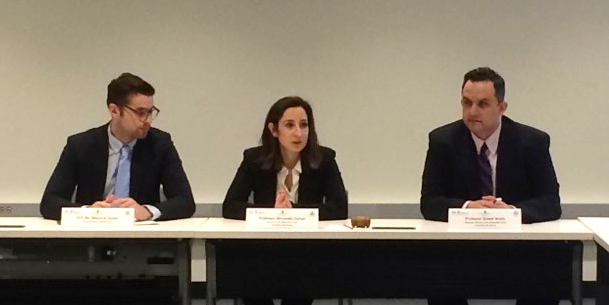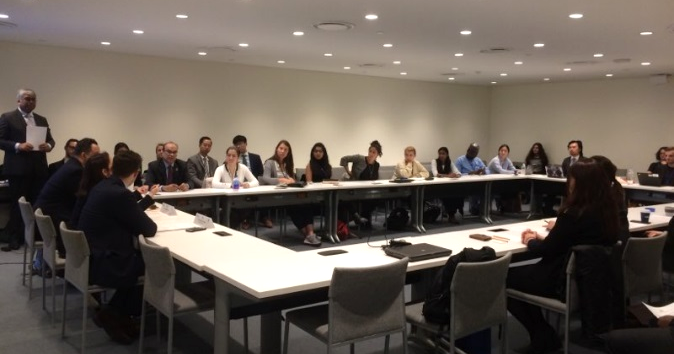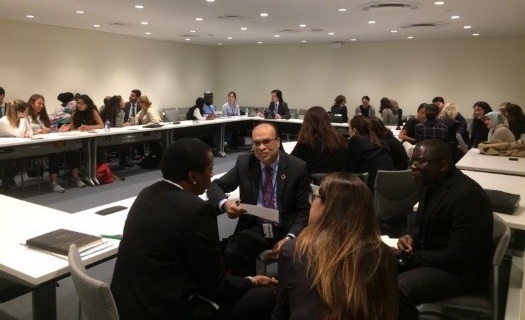UNITAR Hosts Second Course of Columbia Law School Series
2 November 2018, New York, USA - The United Nations Institute for Training and Research (UNITAR), in collaboration with Columbia Law School, hosted the second lecture in its 3-part series sponsored by the Permanent Mission of Sweden as a part of the programme “Levelling the Playing Field to support the Least Developed Countries’ (LDCs) and Small Island Developing States’ (SIDS) Diplomats”. The topic discussed was “Women, Peace and Security” and was held in United Nations Headquarters in New York, USA.
 Head of UNITAR New York office Mr. Marco Suazo opened the session with welcoming remarks to the participants. He then passed the floor to Professor Alexander Carter, Director of the Mediation Clinic, Columbia Law School; Professor Shawn Watts, Associate Director of the Mediation Clinic, Columbia Law School; and students of Columbia Law School: Mr. Andrea Gallinucci-Martinez, Mr. Anand Srivastava, Ms. Bojun, Mr. Shinji Ryu, Mr. Satoru Nagano. and Ms. Maryam Najam. The session was focused on gender equity in mediation and negotiations processes, and the goals of the workshop were to understand the importance and urgency of increasing women’s participation in peace negotiation processes; recognizing there are barriers that currently prevent women from fully participating in negotiations; and how change can made at an organizational level and institutional level.
Head of UNITAR New York office Mr. Marco Suazo opened the session with welcoming remarks to the participants. He then passed the floor to Professor Alexander Carter, Director of the Mediation Clinic, Columbia Law School; Professor Shawn Watts, Associate Director of the Mediation Clinic, Columbia Law School; and students of Columbia Law School: Mr. Andrea Gallinucci-Martinez, Mr. Anand Srivastava, Ms. Bojun, Mr. Shinji Ryu, Mr. Satoru Nagano. and Ms. Maryam Najam. The session was focused on gender equity in mediation and negotiations processes, and the goals of the workshop were to understand the importance and urgency of increasing women’s participation in peace negotiation processes; recognizing there are barriers that currently prevent women from fully participating in negotiations; and how change can made at an organizational level and institutional level.
 To start the workshop, Mr. Andrea Gallinucci-Martinez and Ms. Maryam Najam led an interactive exercise, placing the participants into groups, and giving them a fictional situation where they were asked to rank individual responsibility for causing the situation. Then, Mr. Anand Srivastava discussed the importance of including women, and how achieving Sustainable Development Goal (SDG) 5 concerning gender equality is critical to achieving many of the SDGs. Mr. Srivastava talked about how women have a vital role to play in ending poverty and hunger, but also highlighted the societal problems that women still face, such as domestic violence. After this, he talked about some of the targets of SDG 5, and the fact that there are still areas for improvement, particularly when it comes to political representation of women. Mr. Srivastava also discussed the absence of women in negotiations, with women playing a small role in peace processes between 2000 and 2017, as well as highlighting the absence of women at the UN level.
To start the workshop, Mr. Andrea Gallinucci-Martinez and Ms. Maryam Najam led an interactive exercise, placing the participants into groups, and giving them a fictional situation where they were asked to rank individual responsibility for causing the situation. Then, Mr. Anand Srivastava discussed the importance of including women, and how achieving Sustainable Development Goal (SDG) 5 concerning gender equality is critical to achieving many of the SDGs. Mr. Srivastava talked about how women have a vital role to play in ending poverty and hunger, but also highlighted the societal problems that women still face, such as domestic violence. After this, he talked about some of the targets of SDG 5, and the fact that there are still areas for improvement, particularly when it comes to political representation of women. Mr. Srivastava also discussed the absence of women in negotiations, with women playing a small role in peace processes between 2000 and 2017, as well as highlighting the absence of women at the UN level.
 Professor Alexander Carter then talked about two case studies on the inclusion of women; the first was about gender in the Obama Administration, and the use of amplification to increase the contributions of women, and how during Obama’s second term gender parity was achieved in the President’s inner circle and among his top aides. The second case study looked at gender inclusivity in Rwanda, and how the government pledged to appoint women to leadership, which was reflected in the 2003 Constitution, and today 61% of Rwanda’s parliamentary seats are held by women. She then talked about top-down and bottom-up approaches to empowering women, highlighting the benefits and limitations of both approaches. To finish the workshop, the participants took part in a negotiation role play between three fictional, conflicting countries and a UN mediator, with the goal to resolve the issue and create a mutually-beneficial agreement. The participants were given details of their country’s background, goals and sensitive information.
Professor Alexander Carter then talked about two case studies on the inclusion of women; the first was about gender in the Obama Administration, and the use of amplification to increase the contributions of women, and how during Obama’s second term gender parity was achieved in the President’s inner circle and among his top aides. The second case study looked at gender inclusivity in Rwanda, and how the government pledged to appoint women to leadership, which was reflected in the 2003 Constitution, and today 61% of Rwanda’s parliamentary seats are held by women. She then talked about top-down and bottom-up approaches to empowering women, highlighting the benefits and limitations of both approaches. To finish the workshop, the participants took part in a negotiation role play between three fictional, conflicting countries and a UN mediator, with the goal to resolve the issue and create a mutually-beneficial agreement. The participants were given details of their country’s background, goals and sensitive information.
This session strengthened participants’ understanding of the importance of including women in negotiation and peace processes, and ideas on how to increase women’s participation in negotiations. The final session of the series will be held on November 14th, and will be discussing Leadership and Conflict Resolution.
Photo 1: (from left to right) Mr. Pelayo Alvarez, UNITAR, Professor Alexandra Carter, Director of the Mediation Clinic and Professor Shawn Watts, Associate Director of the Mediation Clinic.
Photo 2: Mr. Anand Srivastava talking to the participants about the interconnectedness between SDG 5 Gender Equality and other SDGs.
Photo 3: Participants during the final interactive exercise of the workshop, a negotiation role play.

